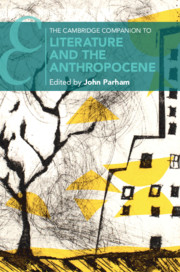Book contents
- The Cambridge Companion to Literature and the Anthropocene
- The Cambridge Companion to Literature and the Anthropocene
- Copyright page
- Contents
- Figures
- Contributors
- Acknowledgements
- Chronology
- Introduction
- Prologue Earth, Anthropocene, Literary Form
- Part I Anthropocene Forms
- Chapter 3 Poetry
- Chapter 4 The Novel
- Chapter 5 Popular Fiction
- Chapter 6 The Essay
- Chapter 7 Theatre and Performance
- Chapter 8 Interspecies Design
- Chapter 9 Digital Games
- Part II Anthropocene Themes
- Further Reading
- Index
- Cambridge Companions To …
Chapter 6 - The Essay
from Part I - Anthropocene Forms
Published online by Cambridge University Press: 28 July 2021
- The Cambridge Companion to Literature and the Anthropocene
- The Cambridge Companion to Literature and the Anthropocene
- Copyright page
- Contents
- Figures
- Contributors
- Acknowledgements
- Chronology
- Introduction
- Prologue Earth, Anthropocene, Literary Form
- Part I Anthropocene Forms
- Chapter 3 Poetry
- Chapter 4 The Novel
- Chapter 5 Popular Fiction
- Chapter 6 The Essay
- Chapter 7 Theatre and Performance
- Chapter 8 Interspecies Design
- Chapter 9 Digital Games
- Part II Anthropocene Themes
- Further Reading
- Index
- Cambridge Companions To …
Summary
In The Great Derangement, Amitav Ghosh sets out to explore how literary forms and conventions have contributed to a ‘narrative imagination’ that is ill-equipped to grapple with climate change. He claims in passing that in comparison with the novel, which is his primary generic focus, literary non-fiction has been better able to circumvent culturally embedded ‘modes of concealment’ that prevent us from thinking the ‘unthinkable’. Yet, Ghosh does not explore how and why creative non-fiction might be more amenable to addressing climate change. Through a reading of The Great Derangement as creative non-fiction, as well as other examples of the genre, this chapter examines the genre’s potential benefits and limitations for shaping a ‘narrative imagination’ that disrupts the ‘modes of concealment’ bequeathed by colonial modernity.
- Type
- Chapter
- Information
- The Cambridge Companion to Literature and the Anthropocene , pp. 117 - 131Publisher: Cambridge University PressPrint publication year: 2021
- 1
- Cited by

